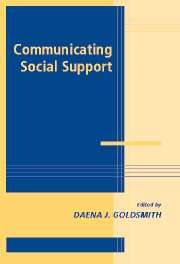Book contents
- Frontmatter
- Contents
- Acknowledgments
- Introduction
- 1 Puzzles in the Study of Enacted Social Support
- 2 Conceptualizing Enacted Support as Communication
- 3 Communicating Advice
- 4 Reexamining Matching Models of Social Support
- 5 Problematizing Provider/Recipient Roles in Troubles Talk
- 6 Conclusions and Implications
- Appendix
- References
- Index
3 - Communicating Advice
Published online by Cambridge University Press: 27 March 2010
- Frontmatter
- Contents
- Acknowledgments
- Introduction
- 1 Puzzles in the Study of Enacted Social Support
- 2 Conceptualizing Enacted Support as Communication
- 3 Communicating Advice
- 4 Reexamining Matching Models of Social Support
- 5 Problematizing Provider/Recipient Roles in Troubles Talk
- 6 Conclusions and Implications
- Appendix
- References
- Index
Summary
When someone close to us discloses a stress or problem, it is quite common to respond with advice about how to resolve or improve the situation (Cutrona, 1986; Cutrona & Suhr, 1994; D'Augelli & Levy, 1978; Goldsmith & Dun, 1997; Horowitz et al., 2001; Laireiter, Baumann, Perkonigg, & Himmelbauer, 1997; Reisman & Shorr, 1980). However, advice receives quite mixed evaluations from recipients, even in situations when we might expect it to be helpful (Cutrona & Suhr, 1994; Dunkel-Schetter, 1984; Dunkel-Schetter et al., 1992; Laireiter et al., 1997; Lehman et al., 1986; Notarius & Herrick, 1988; Pearlin & McCall, 1990; Pistrang et al., 2001; Tripathi et al., 1986; Zich & Temoshok, 1987). Research on coping suggests when people experience a controllable problem, it is adaptive to engage in problem-solving efforts (for reviews, see Aldwin, 1994; Thoits, 1995). Yet when others attempt to assist with problem-solving efforts by offering suggestions about what to do, the effects are quite varied. Why is advice not more widely appreciated and why do people persist in offering a type of support with such dicey prospects for success?
In this chapter, I develop an explanation for these puzzling findings and describe some of the conditions under which advice may be a useful type of enacted support. Using the framework described in Chapter 2, I view advice as one way of pursuing the communicative task of assisted coping.
- Type
- Chapter
- Information
- Communicating Social Support , pp. 52 - 79Publisher: Cambridge University PressPrint publication year: 2004



